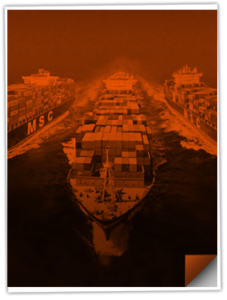Featured Headlines:
CBP Commissions New Commissioner
Census Proposes Change to AES Filings
New Import Requirements for HFC
Certain Section 232 Exclusions Removed
10 Reasons to Ship to Baltimore!
Charleston Chews CSX Backlog Dilemma
Domestic Junk Drawer of Odds and Ends
Quantum Increase in Trade Tensions
Airy Expectations for Air Cargo
Attractive Air Pricing is in the Eye of the Beholder
CBP Commissions New Commissioner
- This week, Secretary of Homeland Security Alejandro N. Mayorkas swore in Chris Magnus as the 5th Commissioner of U.S. Customs and Border Protection (CBP).
- Magnus served as the Police Chief of Tucson, Arizona, Fargo, ND and Richmond, CA.
- NCBFAA President Jan Fields said, “We look forward to partnering with Commissioner Magnus and his team to achieve an appropriate balance between facilitation that enhances our country’s economic and financial strength and enforcement that guards against threats to our personal and collective health, safety, and security.”
Census Proposes Change to AES Filings
This week, the Census Bureau, part of the Department of Commerce, issued a Notice of Proposed Rulemaking to add a conditional data element, country of origin, when foreign origin is selected in the Foreign/Domestic Origin indicator field in the Automated Export System (AES).
The Foreign Trade Regulations (FTR) defines foreign goods as goods that were originally grown, produced, or manufactured in a foreign country, then subsequently entered into the United States, admitted to a U.S. Foreign Trade Zone (FTZ), or entered into a CBP bonded warehouse, but not substantially transformed in form or condition by further processing or manufacturing in the United States, U.S. FTZs, Puerto Rico, or the U.S. Virgin Islands.
The goal is to use this information for reexports to create official trade statistics in order to identify the gaps in domestic product and supply, evaluate supply chains, and address trade imbalances. This would also eliminate the reliance on information provided by foreign partners.
Census realizes that exporters will need sufficient time to update internal and/or proprietary computer systems, and/or the technology utilized to implement the required changes to the AES. Census estimates that 12-18 months may be required for these updates.
Exporters must also consider the commercial invoice information provided to your forwarder or internal agent filing the Electronic Export Information (EEI). Each line indicated as foreign, must show the actual foreign country of origin. This information must be made available on the commercial invoice and tallied for each Schedule B/HTS number indicated showing the value of the domestic portion and the value of the foreign portion for the EEI filing.
This may impact your accounting information and have an impact on the time it takes to file the EEI information to the Automated Export System. It’s important for exporters to think of the impact this will have on all departments in your company, the advanced manifest information required by certain countries, the information sent to your consignee on the commercial invoice, and the impact on the filer of the EEI information.
The Census Bureau is seeking public comments from data users, businesses, and others to assess this proposed change on foreign trade statistics. Below are questions to consider when providing feedback to this proposed rule; however, any pertinent feedback not captured by these questions is welcome.
- Describe potential uses of the Census Bureau’s statistical data of international trade.
- Describe the potential value of adding country of origin to the EEI if using the Census Bureau’s statistical data of international trade.
- If a stakeholder utilized or managed proprietary software to communicate with the AES, how long would it need to potentially add the country of origin field?
- How long would a company who utilizes or manages proprietary software need to make programming changes to potentially add the country of origin field to its interface to AES?
- Are there business practices that a company would need to implement in order to come into compliance with the reporting of the country of origin field?
- How would the country of origin be identified when companies store or warehouse goods of multiple origins together?
Comments on this proposed rule are due by February 14, 2022 and can be sent to Federal eRulemaking Portal. The identification number for this rulemaking is identified by RIN 0607-AA59.
To access the Portal, please click here.
For additional ways to comment, please read the FR notice. We encourage exporters to read this in its entirety and share with Census how this will impact your business.
Please note: No comments will be posted to the Portal until after the comment period has closed.
Only Originals for APHIS
- Effective December 31st, the Animal and Plant Health Inspection Service (APHIS) will no longer accept unoriginal electronic phytosanitary certificates and PPQ203 forms.
- See CSMS #50385642 for all the details.
New Import Requirements for HFC
- Imports of bulk hydrofluorocarbons (HFCs) and HFC blends of any quantity will require allowances beginning January 1, 2022.
- Additionally, the EPA is requiring information to be electronically filed through ACE 14 days prior to importation.
- The changes were made in support of the American Innovation and Manufacturing (AIM) Act, which directs the Environmental Protection Agency (EPA) to phase down production and consumption of hydrofluorocarbons (HFCs) in the United States by 85% by 2036.
Certain Section 232 Exclusions Removed
- The Commerce Department will end 31 general approved exclusions (GAEs) from Section 232 tariffs on steel and aluminum effective December 27, 2021.
- For affected HTS codes, see the official Federal Register Notice.
10 Reasons to Ship to Baltimore!
- Severe port congestion means that the average lead-time days needed to secure drayage is above 10 days for at least 10 major US gateways.
- The following major transportation arteries require 10+ days to book drayage: Los Angeles, Long Beach, New York, Savannah, Houston, Miami, Norfolk, Seattle, Memphis, and Charleston.
Charleston Chews CSX Backlog Dilemma
- CSX Railroad announced that effective Monday, December 13th, all reservations (loads and empties) to Charleston, SC will be rejected until the container backlog at those ramps can be cleared.
- CSX will provide an update on Monday, December 20th.
Domestic Junk Drawer of Odds and Ends
- After adjusting for cost-of-living and inflation, it is estimated that truckers are paid 40% less today than they were in the late 1970’s before deregulation.
- Turnover for truck drivers working for companies with $30 million in revenue or more sits at a staggering 92% nationwide.
- Cass estimates that prices across all domestic modes are up 31.4% in 2021 vs. 2020.
More Fears of Limbo in Ningbo
- After five people tested positive, over 300,000 people have been tested for COVID in the district of Zhenhai, home of the Port of Ningbo; the district was immediately placed on a two-week lockdown.
- Productivity at the port has yet to be greatly affected, though the global shipping community will long remember previous COVID disruptions in Ningbo and Shenzhen.
- Beijing’s zero tolerance COVID policy is backed up with mass testing, snap lockdowns, extreme surveillance, and lengthy quarantines—all potential causes of logistical disruptions.
- The Port of Ningbo ranks between 1st and 3rd globally for volume on any given month and is expected to handle over 35 million TEUs by the end of the 2021.
Export Attention on Deficits
- The US trade deficit narrowed in October for the first time since July due to an increase in US exports.
- The gap shrank 17.6% to $67.1 billion, from $81.4 billion in September, according to Commerce Department data; this is the biggest percentage drop since 2015.
- The value of goods and services exported rose 8.1% to $223.6 billion in October, the highest on record.
- Exports of industrial supplies and materials increased $6.4 billion and petroleum exports were the highest on record.
Quantum Increase in Trade Tensions
- Trade relationships continue to deteriorate between the US and China as the US Commerce Department announced export controls on eight Chinese quantum computing companies.
- American companies will be barred from exporting certain products to the Chinese companies unless they apply for a special license, and these licenses are rarely approved.
- The Commerce Department stated this was an effort to prevent US emerging technologies from being used for the Chinese military’s quantum computing efforts.
- As a result of the strained relationship between the countries, US trade with Taiwan is booming.
- Since the Biden administration has kept the tariffs on Chinese goods in place, U.S. exports to Taiwan have climbed more than 35%.
Let There Be Light…Containers
- After averaging just under 70% in December, export forecasts out of Long Beach reveal that nearly 75% of expected export volume will be shipping empty, headed back to Asia for lucrative import traffic.
Shuffling the Deck(s) at MSC
- In a series of service advisories, MSC has announced several changes that affect US importers.
- The carrier will extend its Mustang service to add a port call in Busan, South Korea and in Portland, Oregon.
- The MSC Santana service will remove calls in Portland and Tacoma as it shifts to Houston and the East Coast.
Airy Expectations for Air Cargo
- Global measures of manufacturing activity, new export orders, and purchasing confidence have all been in decline since Q2, but these trends connect to extreme supply chain dislocations in ocean freight.
- While global inflation and Chinese power rationing hurt business confidence broadly, air cargo continues to outperform other modes of transport.
- During the key year-end period, airfreight is relatively attractive on costs (down tremendously to only five times the cost of ocean) and is the clear choice for speed to market.
Attractive Air Pricing is in the Eye of the Beholder
- The average rates from all major Chinese gateway airports (Shanghai, Hong Kong, Shenzhen), while broadly plateauing, continue to sit above $20 per kilo and are expected to stay there for the next 5 to 6 weeks.
Are You Blanking Kidding Us?
- Steamship lines are set to blank over 27% of total capacity from Asia to the US in December.
- The carriers justify these capacity adjustments are the only means to get displaced vessels, containers, and chassis in their correct positions for service schedule reliability.



